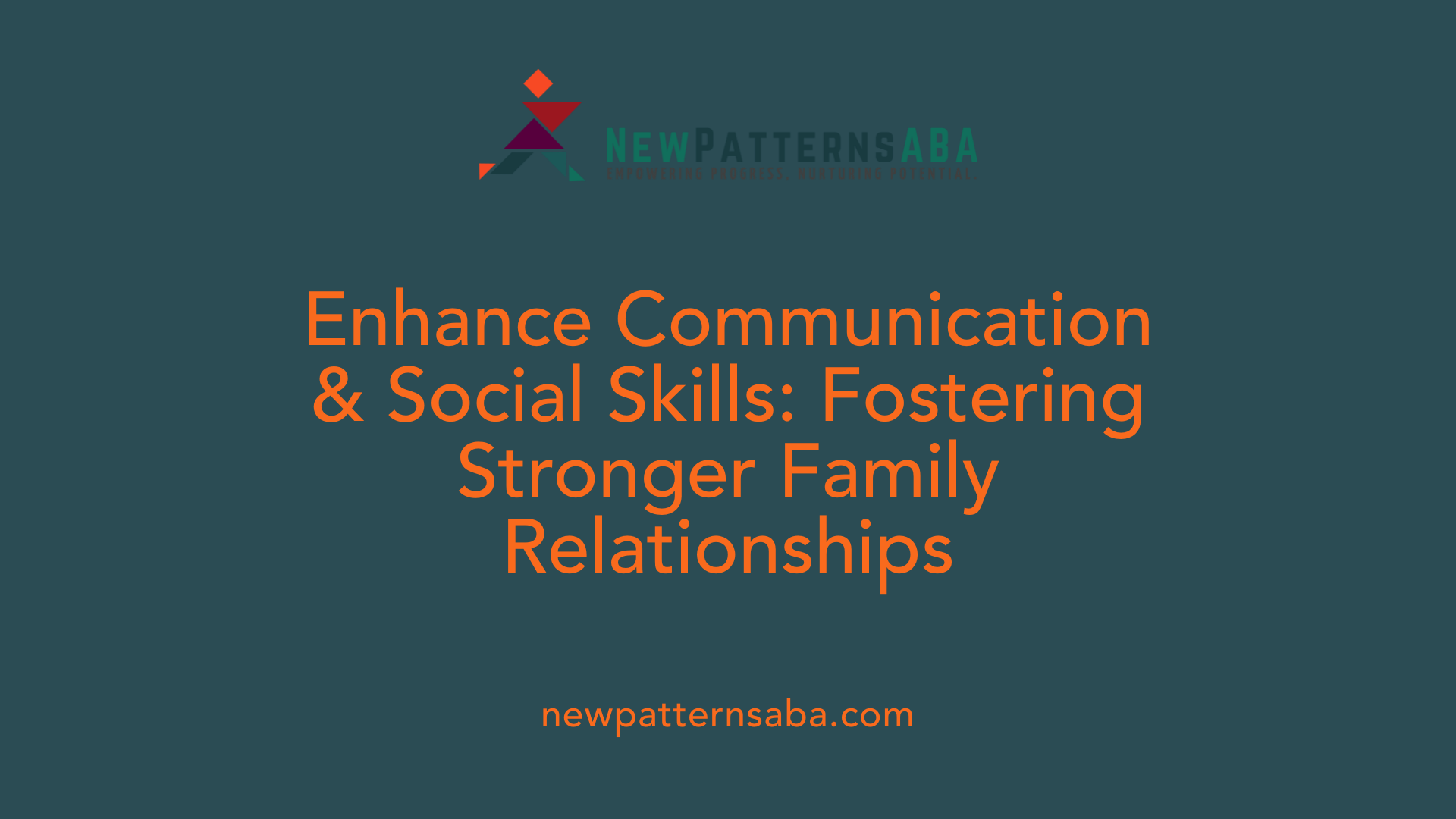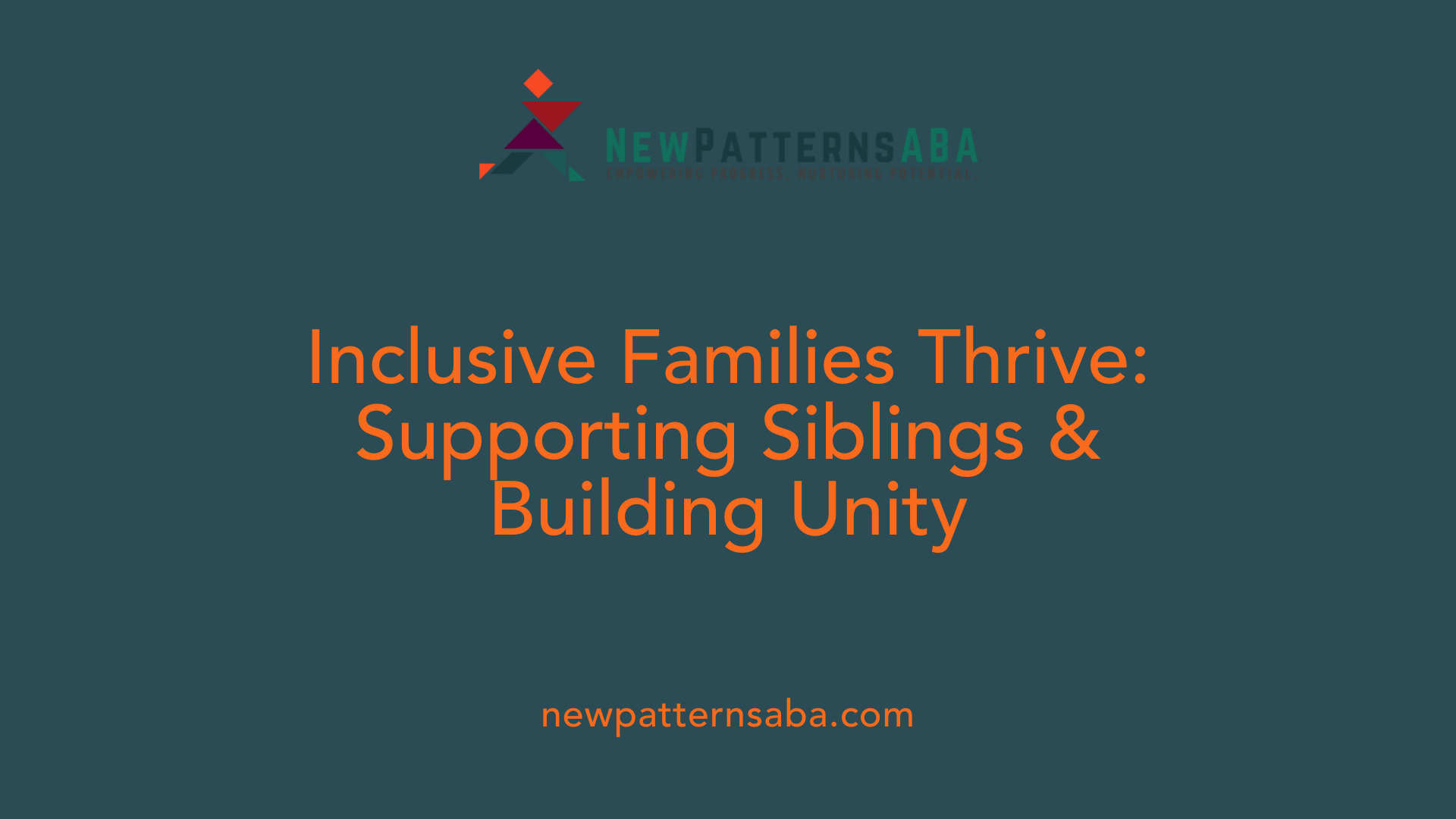Building Strong Family Foundations with ABA
Applied Behavior Analysis (ABA) therapy is a science-backed approach that has transformed the lives of children with autism spectrum disorder (ASD) and their families. By focusing on individualized, data-driven interventions, ABA not only enhances children's developmental skills but also nurtures stronger family relationships. This article explores how ABA therapy benefits children’s growth, deepens family bonds, and promotes a supportive environment where everyone can thrive.
Enhancing Child Development and Family Cohesion
How does ABA therapy benefit children's development and family relationships?
ABA (Applied Behavior Analysis) therapy plays a vital role in supporting children with autism and their families. It teaches children crucial skills such as communication, social interaction, and daily living, tailored specifically to each child's needs. As children learn to express themselves better—whether through words, sign language, or communication devices—they become more independent and confident.
Families actively involved in ABA therapy gain practical strategies to support their child's progress. Through parent training sessions, caregivers learn how to reinforce positive behaviors at home, manage challenging behaviors, and implement routines that foster stability.
Involving siblings and other family members enhances the bonding process. Siblings can participate in activities designed to promote empathy and understanding, strengthening family ties.
In-home ABA therapy offers unique advantages by integrating learning into familiar settings. This environment allows therapists to address behavioral challenges as they naturally occur and utilize everyday materials for teaching, leading to more meaningful and functional skill development.
Regular assessments and progress tracking enable customized goal-setting. Adjustments to the therapy plan ensure continuous growth, keeping children motivated and engaged.
Overall, ABA therapy not only boosts children’s abilities to navigate social situations and perform daily tasks, but it also fosters a more connected and supportive family environment. Families feel empowered to build lasting, positive relationships that contribute to the child's overall well-being.
Strengthening Family Bonds Through Structured Support and Skill Building

How does ABA therapy help strengthen family bonds through structured support and skill-building?
ABA therapy plays a vital role in nurturing stronger connections within families by enhancing communication and emotional understanding. As children learn new skills such as effective expression and social interaction, families find it easier to communicate and connect on a deeper level.
Involving siblings in therapy sessions is a core strategy. It helps develop empathy and awareness of autism traits, enabling siblings to better support their brother or sister. This inclusion fosters a sense of teamwork and shared responsibility.
The approach incorporates shared routines and engaging activities like cooperative games, arts and crafts, or family outings. These shared experiences not only make therapy enjoyable but also cement positive relationships through quality time.
Supporting the entire family involves open communication and emotional support techniques. Educating parents and siblings on autism, providing strategies for managing behaviors, and reinforcing learning at home reduce frustrations and sibling rivalry. This collective effort cultivates a peaceful and cooperative environment.
Through these methods, ABA therapy does more than develop essential skills in children; it actively promotes empathy, understanding, and cooperation among family members. The combination of structured routines, inclusive involvement, and shared activities encourages a family atmosphere rooted in support and harmony.
| Aspect | How It Contributes to Family Bonding | Additional Details |
|---|---|---|
| Communication & Emotions | Improves understanding and expression | Children communicate needs; family members respond empathetically |
| Sibling Involvement | Promotes empathy and support | Siblings learn to support and be role models |
| Shared Routines & Activities | Foster positive interactions | Cooperative play strengthens bonds |
| Family Harmony & Cooperation | Reduces conflicts, increases teamwork | Open communication and emotional support |
This integrated approach makes ABA therapy a powerful tool not just for child development but also for cultivating a harmonious, supportive family environment.
Impact of ABA on Communication, Social Skills, and Family Dynamics

What is the impact of ABA therapy on communication and social skills within families?
ABA therapy has a profound positive effect on a child's ability to communicate and engage socially. It fosters improvements in both verbal and non-verbal communication, helping children express their needs and understand others better. Using techniques like modeling, shaping, and positive reinforcement, children learn to participate in reciprocal interactions such as turn-taking, sharing, and active listening.
These learned behaviors translate into more harmonious family relationships. As children communicate more effectively, misunderstandings decrease, reducing family stress and promoting closer bonds. Enhanced social skills also enable children to connect better with siblings and parents, strengthening the overall family unit.
Through structured routines and parent training, families gain tools to reinforce these skills daily. This supportive environment encourages social inclusion, helping children participate in community activities and develop lifelong social and emotional skills.
In summary, ABA therapy not only boosts a child's communication abilities but also enriches family interactions, leading to greater cohesion and a more positive family dynamic.
Table 1: Benefits of ABA on Family Communication and Social Skills
| Aspect | Improvement | Family Impact |
|---|---|---|
| Reciprocal interactions | Better turn-taking and sharing | More engaging family play and bonding |
| Verbal skills | Increased vocabulary and conversation | Clearer communication reduces frustration |
| Non-verbal cues | Improved understanding of gestures and expressions | Greater empathy and emotional connection |
| Social skills | Learning to join group activities | More inclusive community participation |
| Family cohesion | Reduced conflict and misunderstandings | Stronger emotional support and trust |
Expanding community involvement is also a significant benefit. As children develop communication and social skills, families find it easier to engage in community activities, promoting social integration and reducing feelings of isolation. Overall, ABA intervention supports a more connected family environment and encourages lifelong social development.
Parental Involvement: A Keystone to Successful ABA Outcomes

Why is parental involvement important in ABA therapy?
Active participation by parents in ABA therapy plays a critical role in optimizing a child's progress. When parents are involved, they can apply learned strategies consistently across different settings, such as at home, school, or community activities. This consistency helps children generalize skills more effectively, leading to better long-term retention.
Research shows that children whose parents participate actively tend to experience faster and more significant improvements. Parent training sessions equip caregivers with practical techniques like positive reinforcement and behavior management, enabling them to support ongoing learning outside of formal therapy sessions.
Moreover, parental involvement nurtures a stronger emotional connection with the child. It boosts parental confidence, reducing stress and anxiety related to managing challenging behaviors or developmental delays. Parents who understand therapy goals and methods are better prepared to advocate for their child's needs and collaborate effectively with professionals.
Regular monitoring and adaptive strategies are vital. Parents help observe the child's responses, provide feedback, and work with therapists to modify routines and interventions as the child develops. This active engagement ensures that therapy remains personalized and responsive.
In addition to skill development, involved parents foster a supportive environment that enhances a child's motivation and emotional well-being. Providing ongoing education and emotional support to parents helps sustain their confidence, resilience, and capacity to navigate the challenges of therapy.
Overall, fostering parent involvement is not only about implementing techniques—it's about creating a partnership that empowers families, enhances treatment effectiveness, and ultimately leads to meaningful improvements in the child's communication, social skills, and independence.
Supporting Siblings and Creating Inclusive Family Spaces

How can ABA therapy support and improve sibling relationships?
ABA therapy plays a significant role in fostering stronger sibling bonds by teaching children important social skills, communication, and self-regulation. When children on the autism spectrum learn to express themselves effectively and behave cooperatively, interactions with siblings become more positive and enjoyable.
Including siblings in therapy sessions and family discussions helps build understanding and empathy. Siblings gain insight into autism and learn ways to support their brother or sister, which reduces misconceptions and promotes patience.
Shared routines and activities, such as games or arts and crafts, create opportunities for siblings to connect in a relaxed environment. These experiences reinforce learned behaviors and serve as bonding moments.
Educating siblings about autism is crucial. When they understand their brother's or sister's behaviors and challenges, they are more likely to show compassion and patience.
Involving siblings in the goal-setting process and reinforcement strategies can foster a sense of responsibility, ownership, and teamwork within the family. They may act as role models, helping reinforce positive behaviors and social skills learned through ABA.
Overall, an inclusive ABA approach encourages collaboration, empathy, and shared experiences. This not only improves sibling relationships but also enhances overall family harmony, creating a supportive environment where everyone can thrive.
The Broader Impact of ABA on Family Well-being and Stress Management

What are the overall effects of ABA therapy on family well-being and stress levels?
ABA therapy significantly boosts family well-being by enhancing communication among family members. When children with autism learn new social and behavioral skills, families often experience more positive and meaningful interactions, leading to stronger bonds.
Reducing daily challenges is another vital benefit. ABA addresses problematic behaviors and helps children regulate emotions better, resulting in smoother routines and less chaos at home. This makes everyday life more manageable and less stressful for caregivers.
Moreover, parental empowerment plays a crucial role. With proper training and support from ABA therapists, parents gain confidence and practical tools they can use outside therapy sessions. This increased sense of control encourages consistency and reinforces learned skills.
As children develop greater independence and social skills, families enjoy improved cohesion. Happy, well-adjusted children contribute to a harmonious household, reducing frustration and fostering a supportive environment.
Overall, ABA therapy promotes healthier family dynamics and resilience. It helps families overcome daily hurdles, reduces emotional burdens, and enhances quality of life for both children and their loved ones.
Nurturing Growth and Harmony in Families
ABA therapy plays a pivotal role in not only advancing children's developmental milestones but also in weaving stronger, more empathetic family bonds. Through personalized strategies, active parental involvement, and inclusive family activities, ABA fosters an environment of understanding, cooperation, and resilience. As families see their children thrive and their relationships deepen, the overall well-being and happiness of the household flourish. Embracing ABA as a core part of a child's developmental journey ensures a supportive, nurturing, and joyful family life.
References
- The Impact of ABA on Families - Prospera Healthcare
- Should I Enroll My Child in ABA Therapy? A Guide for Parents
- Should Parents Stay During ABA Therapy Sessions?
- Supporting Sibling Relationships with ABA Therapy
- Strong and Effective Relationships with Parents and Therapists
- Benefits of ABA Therapy for Children - First Step Arkansas
- Understanding Applied Behavior Analysis (ABA) Therapy





